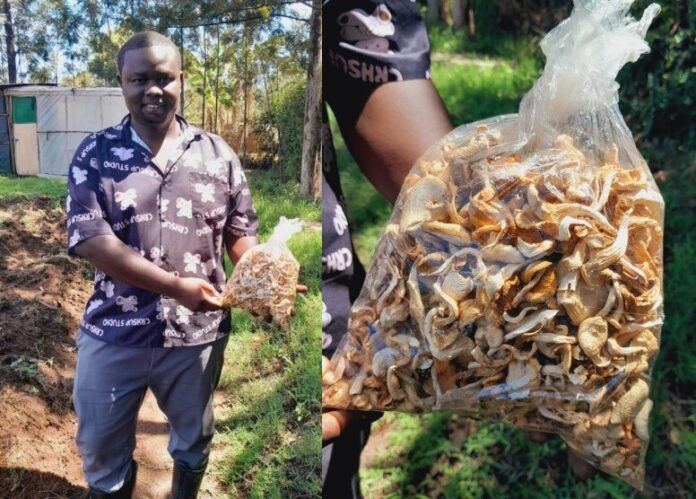Juma Sylvester, a law graduate has found success after ditching the traditional agribusiness ventures to embrace innovative mushroom production agribusiness.
The founder of Kajulu Farms in Kisumu primarily focuses on Oyster mushrooms, one of the most adaptable varieties.
The farmer embarked on the farming journey in 2020 after undergoing training from his friend on mushroom production.
He would later undertake mushroom production courses and research to enable him even train others in the production.
According to Sylvester, oysters, an edible type of fungi, are some of the easiest types of mushrooms to grow due to their fast growth, and tolerance to growing conditions.
This variety is one of the most versatile mushrooms in the world and can do well under any form of climate or temperature.
They are typically light grey or brown and can come in different colours including yellow and pink.
How to make good money growing Oyster mushrooms
On his farm, the fungi which are also considered vegetables are produced indoors in controlled temperatures. Paper bags or cartons are used to aid production because of the substrate used to form the base.
A mixture of organic waste materials like maize cobs, dry banana leaves, sugarcane bagasse, rice straw, hyacinth, and sawdust are often used as substrates.
He notes the incubation room has to be very dark and quite hot about 28 degrees Celsius to aid mycelia which likes to grow/camouflage in dark places.
The level of aeration in the room should be at least 17 percent to provide optimum growth of the mushroom. The farmer sprays water on the floor, wall, and bags to maintain the moist temperature.
To maintain a constant quality supply of his produce, he uses high heat in the incubation stage to ensure the mushrooms remain unaffected by other competing fungi.
Footbaths at the doors of the mushroom houses also help in discouraging mold contamination. He notes that production cost is usually low given he uses simple organic waste sourced locally.
“There is no need of using organic waste that is so expensive thereby increasing the cost of production,” Sylvester says.
Each 2.5kg bag produces mushrooms for three months, generating substantial profits. From each bag, the farmer gets about 500 grams of mushroom which is approximately 500 shillings. The harvest and purchase are done in cycles.
He sells his produce locally to wholesalers who use them to bake and make flour at Sh250 for 250 grams of fresh mushrooms while the dry ones, a kilo goes for 3000 shillings.
Sylvester notes that most of the sales are done in dry form. Yearly the production can hit 50-60 kilograms and even more in large-scale farming.
According to a report by the National Farmers Information Service, Kenya produces approximately 500 tonnes of mushrooms annually against the demand of 1200 tonnes.
This underscores the potential of mushroom farming to ensure food security.









